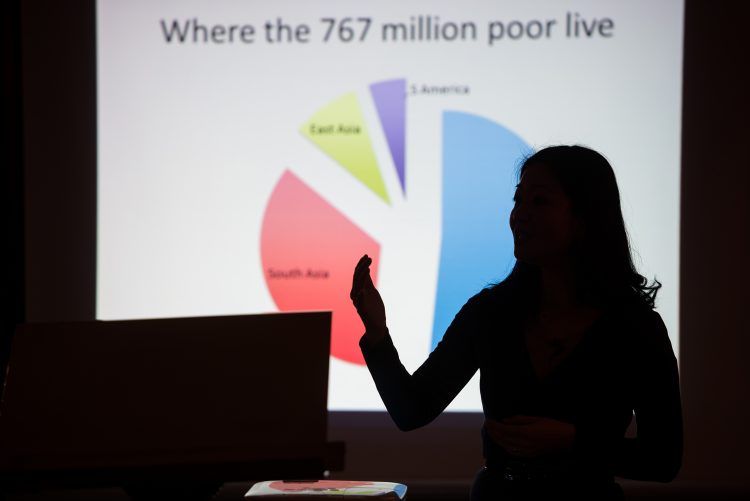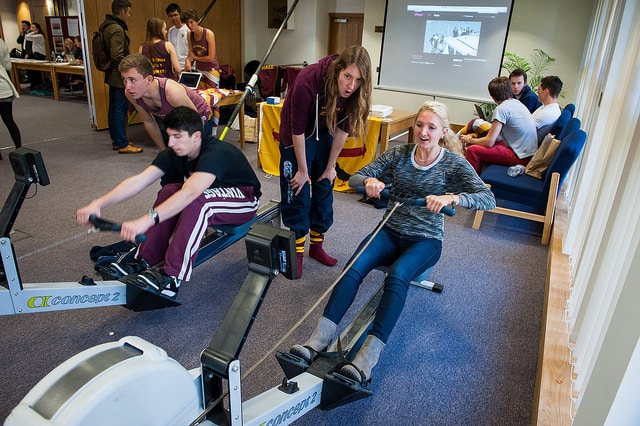Anna – Economics and Management
Journey to Oxford
I grew up in Bournemouth and went to a grammar school during my secondary school years. I swapped to an independent school for sixth-form on a full scholarship & bursary. I applied during sixth-form to study another subject but didn’t get into Oxford. Instead I took a gap year, where I worked at a consultancy company called Accenture. I then reapplied for Economics and Management at Oxford.
Why did you choose to study your course?
When I was thinking about re-applying to University, I looked back at the books I’d read and enjoyed most over the previous few years. I suddenly realised they were all Economics or Business related. Realising that was something I could study as a degree was quite exciting. I didn’t formally study either Economics or Business at school, but Maths was the only required subject and learning more about Economics and Management in the process of applying was strangely fun.
What is your favourite thing about it?
Economics and Management are two subjects with people at the centre of them. Both teach you how the world functions and how decisions are made. We, as individuals, are dependent on the economic and management structures that surround us and which we might not always be conscious of. I like how my degree has made me more analytical and given me this different perspective on the world and current affairs.
How is your course taught?
My course is taught via a mixture of lectures, tutorials and classes. In the first year, I had 7 hours of lectures, 3 hours of tutorials, and a 1.5-hour class every week.
Lectures vary in length and amenities – the Management lectures at Said Business School are longer but include a coffee break (with free coffee!), whilst the first year Economics lectures were a two-minute walk across the road at Exam Schools and an hour long each.
Tutorials usually last for an hour to an hour and a half. Whilst I first found tutorials quite scary, I’ve grown to really value them as the Teddy Hall college tutors genuinely want to help us reach our potential. The tutor and two/ three students sit in a room to discuss the essay or problem set you did that week and talk through where you went wrong. It helps me to tie the week’s content together and work out what I don’t fully understand yet. Classes are slightly bigger groups but work similarly to tutorials.
Describe your average Oxford day…
I always go to breakfast in college around 8.30am, catching up with college friends over a full English breakfast. I then cycle to the Said Business School to study in the library. In first year, I often had Management lectures either at the Business School, or Economics lectures across the road at the Exam Schools. When I don’t have lectures, I work on an essay or problem sheet.
I study until lunch, and then head back to college. I either eat with a friend or read/ watch something unrelated to my degree for a bit.
After lunch I might have a tutorial, or I’ll get some of my reading for the week done. I usually lose concentration mid-afternoon and don’t work well, so I tend to go for a coffee and walk to get away from my desk for a bit.
In the evening, I go to college dinner. Afterwards, I often hang out with friends, or go to social events or talks. Sometimes if I’ve had a busy day and not got much work done, I’ll do some light work or tidy up my notes for the week in the evening.
Why did you decide to apply to St Edmund Hall? What is your favourite thing about it now you’re here?
I applied to Teddy Hall because of the Creative Writing Society and the choir- I thought they’d be really fun to be a part of! Ultimately though, I’m glad I applied to Teddy Hall because of the people. There’s something special about the students here– it’s full of people who are incredibly passionate and serious about their studies but also aim for a good work-life balance.
What helped you prepare for the admissions process?
I took a gap year after sixth-form and worked at a consultancy firm (Accenture). A couple of my colleagues had studied Economics at uni, and very kindly offered to do a couple of mock interviews with me over lunch. I also tried to make the most of my commute – reading Economics books on my phone or listening to a podcast.
The best thing I did was that I had an A4 notebook in which I wrote notes about things I’d read or listened to. It made me think more about what it was that I’d learnt from anything I read, listened to, or discussed with colleagues. It also helped me to realise what I was interested in about Economics, and I could then follow up more on those things with other books or online articles.
What was the biggest misconception you had about studying at Oxford before you came?
That I wouldn’t have a social life. It’s taken me a while to get the balance between work and socialising right because there’s so much to do, both at college and as part of the uni as a whole. I tried out a lot of different things in first year and found out what I enjoy doing. I expected everyone to work hard, but I was very glad to find out that people make time for social stuff too.
What would you tell your 17-year-old self about applying to and studying at Oxford/St Edmund Hall now?
Don’t stress unnecessarily about applying to Oxford. Focus on what you can control – by learning as much as you can about your subject.
When I applied in sixth form, I was so busy stressing about the process of applying and whether I would even get in that I didn’t stop to think much about the subject I was applying for. Second time around, I found that I really enjoyed the process – because I’d found two subjects that I enjoyed learning more about. Reading for my personal statement was fun and I treated the interviews as a chance to speak with experts about two subjects I was interested in. Focusing on learning about my subject helped to reduce the stress of applying.
Where next?


